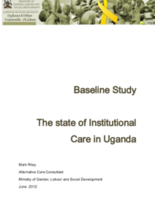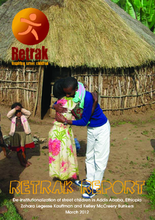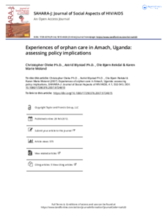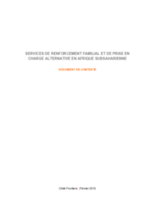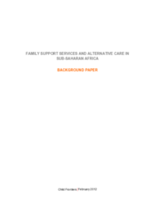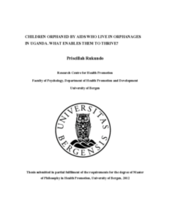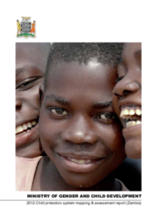Displaying 531 - 540 of 665
This study from CESVI examines the magnitude and characteristics of child labor in Kenya, particularly the “worst forms of child labour (WFCL) in Kenya,” with a focus on the urban context of Nairobi and on the rural context of the Nyanza province.
This document summarises the key findings of the project to-date and the current status of the child care and alternative care directory. It also outlines some key activities that need to be undertaken for the MoGLSD to start to address the issues outlined within the report. The MoGLSD has carefully evaluated the baseline study and after a number of consultations wish to put forward this document as a proposal to address the serious issues of children without parental care and the growing number of children’s homes.
The paper argues that investing in Malawi’s emerging national child protection system will support national social protection goals. The Government is bringing together its various responses to child protection and orphans and vulnerable children as the foundation on which to build the national child protection system, with the intention of delivering a coordinated, harmonised and systematic approach to protecting children from violence, abuse, exploitation and neglect.
This study was designed to illuminate the different manifestations of transactional sexual exploitation and abuse among Rwanda's children in order to inform effective responses by policies, programs, and communities.
The study was carried out in Addis Ababa, Ethiopia. The purpose of this research is to utilise information collated from literature review as well as informant interviews and focus group discussions to identify good practices or help inform the development of such practices aimed at assisting street children currently residing in institutional care to return to a family-based environment.
This paper presents findings from a study on the experiences of orphan care among Langi people of Amach sub-county in Lira District, northern Uganda, and discusses their policy implications.
Ce document de contexte et les briefs nationaux individuels ont été commandés afin d'examiner le statut actuel des services de renforcement familial et de la prise en charge alternative dans dix-huit pays d'Afrique subsaharienne
This background paper and individual country briefs were commissioned to examine the current status of family support services and alternative care in 18 sub-Saharan Francophone, four Anglophone and two Lusophone African countries (a total of 22 countries). This background paper represents a comparative regional analysis, providing an overview of the current situation and illustrating promising practices, opportunities and challenges.
This study aimed at finding out what enables children orphaned by AIDS who live in orphanages to thrive.
This report was conducted to provide an extensive assessment designed to map the existing child protection system in Zambia.


